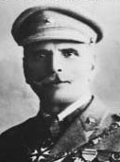 |
Manuel de Oliveira Gomes da Costa
b. 14 Jan 1863, Lisbon
d. 17 Dec 1929, Lisbon |
| Title: |
Presidente do Ministério (President of the Ministry) [1] |
| Term: |
17 Jun 1926 - 9 Jul 1926 |
| Chronology: |
17 Jun 1926, appointed, decree of the Government of the Portuguese Republic [2] |
|
17 Jun 1926,
functions of Head of State (Presidente da República) devolved on the ministers acting collectively according to the Constitution of 1911, Art. 38, § 3.° |
|
29 Jun 1926,
President of the Ministry is authorised to exercise the functions of President of the Republic, decree of the Government of the Portuguese Republic [3] |
|
9 Jul 1926, discharged, decree of the Government of the Portuguese Republic [4] |
| Biography: |
The son of a colonial officer of peasant origin; spent a part of his childhood in Timor and Macao, where he attended schools; joined the Army (1880); graduated (1884) from the the Escola do Exército (Army Academy); promoted to alferes (1885), lieutenant (1889), overseas captain (1893), captain (1898), major (1907), lieutenant-colonel (1912), and colonel (1914); served in the Portuguese colonies in India and Africa (1893-1915); distinguished himself in suppressing anti-colonial revolts; upon his return to Lisbon (1915), was appointed an infantry regiment commander; participated in World War I as a division commander of the Portuguese Expeditionary Corps in Flanders; promoted to general (1918); assigned command of the Fourth Military District (1921); became actively engaged into politics, collaborating with the Centrist Party (Partido Centrista), Reformist Party (Partido Reformista), Republican National Federation (Federação Nacional Republicana), and Radical Republican Party (Partido Republicano Radical); constantly criticized the policy of the governments of the Democratic Party (Partido Democrático); sent on a mission to China and India (1922-1924); joined the leaders of the conspiracy, which culminated in overthrowing republican regime (1926); together with Mendes Cabeçadas and Armando Gama Ochoa formed an informal military triumvirate (1 Jun 1926) to rule the country; was appointed war minister (3 Jun 1926 - 9 Jul 1926) and interim minister for colonies (3 Jun 1926 - 19 Jun 1926) [5]; staged another coup and forced Cabeçadas to step down (17 Jun 1926); served as President of the Ministry (17 Jun 1926 - 9 Jul 1926) and interim minister of the interior (17 Jun 1926 - 18 Jun 1926, 6 Jul 1926 - 9 Jul 1926); assumed the functions of President of the Republic (29 Jun 1926); ousted by radical nationalists (9 Jul 1926); was briefly arrested and later exiled to the Azores; staying in exile, he was promoted to marshal (1926); returned to Lisbon (1927). Biography source: [6] |
| |
| [1] |
Acting as a coup leader, claims the assumption of the office of "Chefe do governo" in a proclamation (carta-ultimatum) published 17 Jun 1926. Subsequent recognition of his authority is formalized through a governmental decree published 19 Jun 1926, in which Costa da Gomes is retroactively appointed to the office of Presidente do Ministério on 17 Jun 1926. |
| [2] |
Diário do Govêrno, Sábado 19 de Junho de 1926, I Série, Número 130, Decreto n.° 11:737. |
| [3] |
Diário do Govêrno, Têrça-feira 29 de Junho de 1926, I Série, Número 138, Decreto n.° 11:789 (dated 19 Jun 1926, in force upon publication 29 Jun 1926). |
| [4] |
Diário do Govêrno, Sexta-feira 9 de Julho de 1926, I Série, Número 147, Suplemento, Decreto n.° 11:866. |
| [5] |
Earlier appointments of Gomes da Costa as minister of war, minister of colonies and minister of agriculture (1 Jun 1926) were annulated on 3 Jun 1926 as he refused to take these offices. |
| [6] |
"Os Presidentes da República Portuguesa", coord. by António Costa Pinto and Maria Inácia Rezola (Lisboa: Temas & Debates, 2001) |

